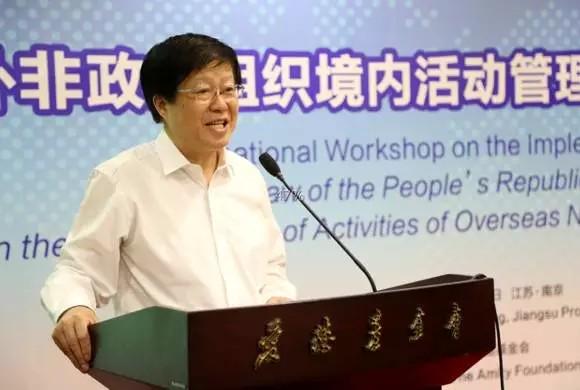Qiu Zhonghui, executive vice chairman and general secretary of the Amity Foundation, gave a speech titled, "Opening and Development -- Amity's Practice in International Cooperation," in an international workshop on the implementation of China's law on overseas NGOs held in Nanjing on May 25, 2017.
He said that the Amity Foundation was established in 1985, when the number of people with an annual per capita income below 200 yuan reached 130 million. "With a Christian background, Amity was created to serve more people and share our love." Claimed Qiu. China's situation at that time also determined that the voluntary organization focused on seeking overseas sources.
In 1987, Amity formed European Network of Amity Partners (ENAP). ENAP is made up of delegates from European partners and other people to explore partnerships and cooperation in the Europe and across the globe.
Qiu stated that the Amity's projects stress a "people first" principle and providing timely help to meet people's basic needs for living. In the past three decades, it has cooperated with more than 300 overseas international organizations, raising a total overseas donation of about 1.5 billion yuan used to support poverty relief and social development and service programs.
Amity has initiated projects in community development and environmental care, public health and AIDS prevention, social welfare, and social enterprises. Regarding public health, it has trained over 16,000 village doctors for nine provinces in western China since the late 1980s. In 1996, when AIDS was rarely known in China, Amity carried out AIDS prevention work in Yunnan in cooperation with the Salvation Army in Australia and in Hong Kong. In addition, it has worked in the fields of social welfare and hospice care thanks to the introduction of advanced international ideas.
Speaking of Amity's social enterprises, it is best known for its printing company. Having produced 162 million Bibles to date, the Amity Printing Company (APC) invests profits in the further production of the Bible and also in charity. As a model enterprise across the globe, the Chinese Bible factory has been the world's company that has printed the most Bibles.
In addition, Amity has introduced more than 2,000 long-term English teachers to teach in colleges and universities. "It was very uneasy to start bringing in so many teachers in 1985", added Qiu. Among them, a foreign teacher was honored a national friendship award. They tell China's story in their mother countries, which is vital to promote friendship between China and other countries. In Qiu's eyes, the exchange of staff is far more important than the attraction of foreign capital.
He claimed that Amity was mainly committed to the "bringing in" strategy to help China with the economic development and construction in the first twenty-plus years. Meanwhile, it began to consider "going global" to give back to the international community at an early time.
He pointed out that the promotion of non-governmental exchange between Chinese religious and social organizations, and foreign aid provided by religious charities, should be one part of the country's "going global" strategy. Despite that the strategy has had different content and been shown in different forms at different stages, Amity has stuck to the basic elements of its strategy -- learning and practice to advance China's reform and opening up, social development, encouraging Christians' part in Chinese social development, and boosting amicable exchanges and source sharing among all nations.
In July 2014, the foundation obtained the consultative status of ECOSOC, marking the beginning of its communication and exchanges with international NGOs on a bigger stage. In July 2015, its African office was inaugurated and established in Addis Ababa, the capital of Ethiopia. A comment by China Philanthropy Times said that the establishment of the office ended the situation that Chinese non-governmental public welfare organizations had no constant funding sources, regular programs, locals employees, or fixed workplaces during the process of "going global". In March 2016, its international office was established in Geneva, Switzerland. What was more, an introduction meeting of Chinese social organizations was held by Chinese NGOs in Geneva that November.
In recent years, Amity has carried out foreign projects of many types, including methane exchange and training project in Madagascar, Typhoon Haiyan in the Philippines, and rescue projects for the 2015 Nepal Earthquake. The efforts have also led to further communication and understanding between nations, peoples, and cultures. Qiu believes that the world will embrace a more open China under the background of "the Belt and Road Initiative" that promotes international cooperation and relations.
Meanwhile, Amity will perfect a mature model and principles that are committed to independence, equity and cooperation, and legality as well as respect and tolerance, in international cooperation and relations.
- Translated by Karen Luo










